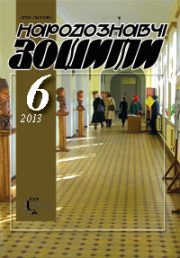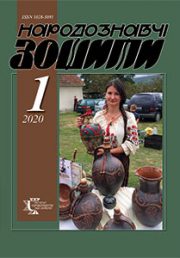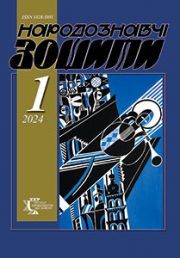The Ethnology Notebooks. 2020. № 2 (152), 267—275
UDK 930:39](571.1/.5)”189″(092)
DOI https://doi.org/10.15407/nz2020.02.267
SIBERIAN ETHNOLOGICAL STUDIES OF POLITICAL EXILE YA. STEFANOVYCH (90’S OF THE XIX TH CENTURY)
BILOUS Vira
ORCID ID: https://orcid.org/0000-0001-7848-180X
Ph D in History,
Senior Researcher, the Department of Modern Ethnology
The Institute of Ethnology of the National Academy of Sciences of Ukraine
15, Svobody Avenue, 79000, Lviv, Ukraine,
Contacts: e-mail: bilka3@gmail.com
Abstract. Introduction. The domain of Ukrainian ethnology includes the studies of traditional culture not only of the own nation, but also of foreign ethnic groups, including those in Siberia. In the conditions of foreign enslavement of Ukraine, the issue of contribution of the compatriots to the understanding of the peoples of the world has rarely been studied, moreover, many of the achievements of our fellow nationals have been appropriated by other nations.
Problem Statement. Today, it is necessary to find and comprehend the Siberian heritage of the fellow nationals and return it to the national intellectual treasury, since this will help to form a holistic view of the role of Ukrainians in the progress of world ethnology. One of those who became acquainted with the traditional culture of autochthons of North Asia in the 19th century was a native of Sumy region, Yakiv Stefanovych. He is well known in the academic circles as an active revolutionary populist, but his ethnographic activity during the Siberian exile is little known to Ukrainian society.
The purpose of the proposed article is to identify the works of Ya. Stefanovych on the ethnology of the peoples of Eastern Siberia, to establish their novelty and scientific value, to reproduce the main biographical milestones of the scientist during the exile period.
The method of historiographic analysis has helped to determine the circumstances of the emergence of Altaian studies, the form and method of collection and analytical activity. The comparative-historical method made it possible to comprehend the legacy of Ya. Stefanovych in comparison with the achievements in Siberian studies by his predecessors and contemporaries, as well as the modern ethnologists.
The exploratory and analytical work resulted in finding out the diverse and fruitful activity of Ya. Stefanovych in North Asia, his involvement has been established in contributing to the knowledge about the most remote eastern ethnic groups of Yakuts and Evenks, the priority in the study of their rock painting and development of methods of recording ritual actions. In conclusions, the importance of Ya. Stefanovych’s ethnological studies for the world Siberian studies and their demand in the modern Altaian studies are emphasized.
Keywords: Ya. Stefanovych, ethnologic studies, traditional culture, expeditions, Evenks, Yakuts.
Received 10.03.2020
REFERENCES
Volkovyns’kyj, V. (2002). Revolutionary terrorism in the 19th century. Political terror and terrorism in Ukraine in the 19th—20th centuries. Historical essay (Pp. 30—72). Kyiv: Naukova dumka [in Ukrainian].
Nikolaieva, V. (1982). From the history of Ukrainian-Yakut relations. Ukrainian historical Journal, 19, 67—73 [in Ukrainian].
Nikolaev, V. (1927). Political reference in the study of the Yakut region. In Yakut captivity. From the history of political exile in the Yakut region. Collection of materials and memories (Pp. 181—202). Moskva [in Russian].
Erlich, V. (2005). Scientific Book of Siberia and the Russian Far East in the XVIII th — beginning of the XX th century. Novosibirsk [in Russian].
Remizovskij, V. (2002). Polish geologists (from materials of personal archive. Vestnik Sahalinskogo muzeja, 9, 329—331 [in Russian].
Tihomirov, L. (2000). Shadows of the new. Moskva: Izdatel’stvo zhurnala «Moskva» [in Russian].
Riabinin-Skliarevs’kyj, O. (1924). Ukrainian songs by Yakiv Stefanovych. Ukraina, 4, 62—63. Kyiv [in Ukrainian].
Popov, I. (1989). Forgotten Irkutsk pages. Notes of the editor. Irkutsk: Vostochno-sibirskoe knizhnoe izdatel’stvo [in Russian].
Stefanovich, Ja. (1896). From Yakutsk to Ayan. Track observations. Zapiski Vostochno-Sibirskogo otdela Imperatorskogo Russkogo geograficheskogo obshhestva (Vol. 2, is. 3, pp. 1—185). Irkutsk [in Russian].
Lukina, A. (2017). Krugovye tantsy ikh znachenie i rol’ v zhiznedeyatel’nosti narodov Severa. Culture and Сivilization (Vol. 7, is. 4А, pp. 665—679). Noginsk [in Russian].
Vasilevich, G. (1969). Evenks. Historical and ethnographic essays (18th — beginning of the 20th centuries). Leningrad: Nauka. Leningradskoe otdelenie [in Russian].
Okladnikov, A., & Mazin, A. (1979). The scribbles of the Aldan river basin. Novosibirs’k [in Russian].
The Khabarovsk Krai will help Yakutia to get to the sea. Retrieved from: http://yakutia.info/article/176044 (Last accessed: 10.10 2019).
Stefanovich, Ja. (1900). The Chuya River. With brief information about its population, fishery and sable industry. Izvestija Vostochno-Sibirskogo otdela Imperatorskogo Russkogo geograficheskogo obshhestva (Vol. 30, is. 2—3, pp. 30—164). Irkutsk [in Russian].
Popov, A. (1932). Materials for bibliography of Russian literature on the study of shamanism of the North Asian peoples. Leningrad [in Russian].
Stefanovich, Ja. (1897). On shamanism. Zemlevedenie, 1—2, 29—48. Moskva [in Russian].
Jeliade, M. (2000). Shamanism and the most ancient ways of ecstasy. Kiev: Sofija [in Russian].
Vajnshtejn, S., & Moskalenko, N. (1995). Problems of the Tuvan shamanism: genesis, chosenness, efficiency of healing shamanistic rituals, modern renaissance. Shamanism and early religious bel (Pp. 62—75). Moskva [in Russian].
Slobodin, S. (2005). The Remarkable Scholar of Northern Peoples (Toward the 150th Anniversary of V.I. Jochelson). Ethnographic survey, 5, 14—30 [in Russian].
Anuchin, D. (1911). On the application of the phonograph in ethnography in particular in the record of shamanistic rituals in Srednekolymsk of the Yakutiya region. Trudy Muzykal’no-etnograficheskoj komissii Obshhestva ljubitelej estestvoznanija, antropologii i etnografii (Vol. 2, pp. 269—297). Moskva [in Russian].
Zelenin, D. (1936). The cult of the Ongons in Siberia. Remnants of totemism in the ideology of the Siberian peoples. Moskva; Leningrad [in Russian].






